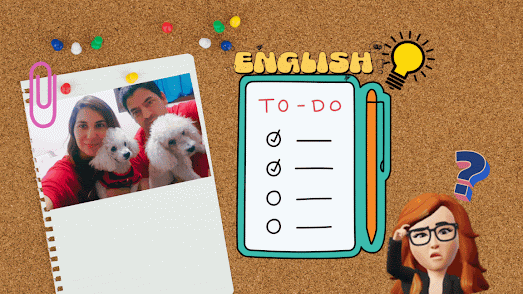The Unforgettable Tenses: Mastering Time in English
Hello everyone!
So I talked here about 'the tenses', but today I resolved to make a summary of tenses. I know, when we are starting a conversation, we forgot what tenses to use, to me the more complicated ones are: perfect tenses .. yep! I stay confused and over making mixes of tenses. So let's over this. come with me.
FIRST: Let's remember all tenses. Can you remember all without seeing the table?! Lol
SECOND: Now, remember all structures of the tenses. Don't worry, I'm here to help you. Let's begin.
PRESENT
1- Present Simple: Used for habits, general truths, and scheduled events.
Affirmative: Subject + base verb
Example: "She reads books."
Negative: Subject + do/does not + base verb
Example: "He does not watch TV."
Interrogative: Do/does + subject + base verb?
Example: "Do you like coffee?"
2- Present Continuous or progressive: Used for actions happening at the moment or around now.
Affirmative: Subject + am/is/are + present participle (-ing form)
Example: "They are playing soccer."
Negative: Subject + am/is/are not + present participle
Example: "She is not studying right now."
Interrogative: Am/Is/Are + subject + present participle?
Example: "Are you listening to music?"
3- Present Perfect:Relates past actions to the present, often with a focus on result.
Affirmative: Subject + has/have + past participle
Example: "I have visited Paris."
Negative: Subject + has/have not + past participle
Example: "She has not finished her assignment."
Interrogative: Has/Have + subject + past participle?
Example: "Have they seen the movie?"
4- Present Perfect Continuous or progressive:Describes ongoing actions that started in the past and continue up to the present moment, emphasizing duration and connection to the present.
Affirmative: Subject + has/have + been + present participle
Example: "He has been working all day."
Negative: Subject + has/have not + been + present participle
Example: "They have not been studying for long."
Interrogative: Has/Have + subject + been + present participle?
Example: "Have you been waiting here?"
PAST
5- Past Simple:Expresses completed actions in the past with a specific time.
Affirmative: Subject + past tense verb
Example: "She visited the museum."
Negative: Subject + did not (didn't) + base verb
Example: "They didn't finish their work."
Interrogative: Did + subject + base verb?
Example: "Did he go to the party?"
6- Past Continuous or Progressive:Describes ongoing actions in the past.
Affirmative: Subject + was/were + present participle
Example: "They were watching a movie."
Negative: Subject + was/were not + present participle
Example: "She was not studying at that time."
Interrogative: Was/Were + subject + present participle?
Example: "Were you sleeping?"
7-Past Perfect:Expresses the completion of one action before another action or point in the past, emphasizing the order of events.
Affirmative: Subject + had + past participle
Example: "She had visited before we arrived."
Negative: Subject + had not + past participle
Example: "They had not finished when I left."
Interrogative: Had + subject + past participle?
Example: "Had you seen it?"
8- Past Perfect Continuous or Progressive:Describes ongoing actions in the past leading up to another past event, highlighting both the duration and interruption of the action.
Affirmative: Subject + had + been + present participle
Example: "He had been working for hours."
Negative: Subject + had not + been + present participle
Example: "They had not been studying for long."
Interrogative: Had + subject + been + present participle?
Example: "Had you been waiting?"
FUTURE
9-Future Simple:Used for predictions, decisions, and promises.
Affirmative: Subject + will + base verb
Example: "She will visit tomorrow."
Negative: Subject + will not (won't) + base verb
Example: "He won't be late."
Interrogative: Will + subject + base verb?
Example: "Will you come?"
10- Future Continuous:Describes ongoing actions in the future.
Affirmative: Subject + will + be + present participle
Example: "They will be studying tonight."
Negative: Subject + will not (won't) + be + present participle
Example: "She won't be working then."
Interrogative: Will + subject + be + present participle?
Example: "Will you be waiting?"
11- Future Perfect:Expresses an action that will be completed before a specific future point, emphasizing the sequence of events.
Affirmative: Subject + will + have + past participle
Example: "I will have finished by then."
Negative: Subject + will not (won't) + have + past participle
Example: "They won't have left yet."
Interrogative: Will + subject + have + past participle?
Example: "Will he have completed it?"
12- Future Perfect Continuous:Expresses an ongoing action that will continue up to a specific future point, emphasizing duration.
Affirmative: Subject + will + have + been + present participle
Example: "She will have been studying for hours."
Negative: Subject + will not (won't) + have + been + present participle
Example: "They won't have been waiting long."
Interrogative: Will + subject + have + been + present participle?
Example: "Will you have been working?"
Hey, wait! But you may say: stop! I'm confused yet!
I know what is your confusion, I pass for this too.
Some tenses may confuse us. So let's see the more confused.
Present perfect Vs past simple
Present Perfect: The present perfect tense relates past actions or events to the present moment, highlighting their relevance or impact on the current situation.
Past Simple: The past simple tense expresses completed actions or events that happened at a specific time in the past. It doesn't focus on their connection to the present.
Present Perfect example: "I have read that book." (Emphasizes the experience of reading, with possible relevance to the present.)
Past Simple example: "I read that book last year." (Emphasizes the past occurrence without direct connection to the present.).
Past perfect continuous Vs present perfect continuous
Present Perfect Continuous or progressive: Connects past actions to the present moment, emphasizing ongoing or recent activities.
Past Perfect Continuous or progressive: Connects past actions leading up to another past event, emphasizing the duration of the action.
Present Perfect Continuous or progressive example: "She has been studying for three hours." (Emphasizes her ongoing study from the past until now.).
Past perfect continuous or progressive example: "She had been studying all night before the exam." (Emphasizes the continuous study that happened before the specific past event of the exam.).
Past simple Vs past perfect
Past Simple: Used for completed actions in the past.
Example: "She finished her work last night." (describe a single action (visiting Paris) completed in the past.).
Past Perfect: Indicates an action completed before another past action.
Example: "They had already eaten when we arrived."(emphasize that her eating (the first action) was completed before my arrival (the second action) in the past.).
Do you have other tenses that confuse you? Share in the comments.
I hope my summary of tenses has helped you!
Goodbye! Until next time!
Download



.gif)




Comments
Post a Comment